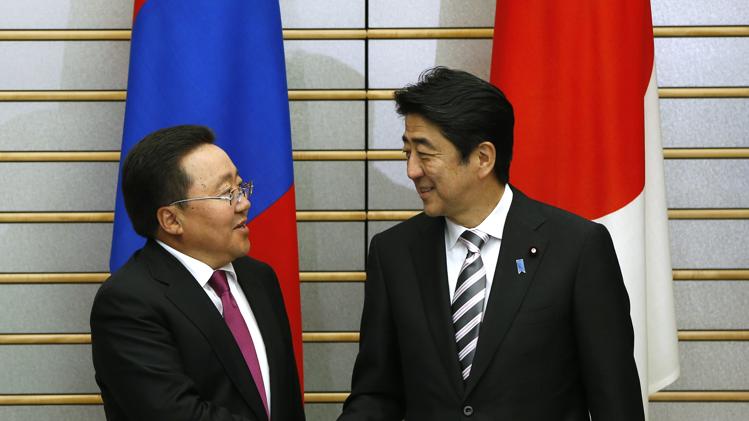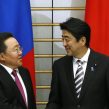
Mongolian-Japanese Economic Partnership Agreement: Counterbalancing China and Russia
Publication: Eurasia Daily Monitor Volume: 11 Issue: 146
By:

On the 40th anniversary of establishing bilateral diplomatic relations, Mongolia’s President Tsakhia Elbegdorj and Japan’s Prime Minister Shinzo Abe met in Tokyo on July 22, 2014, to sign a Joint Statement on affirming the final roadmap toward instituting an Economic Partnership Agreement (EPA). Aimed at promoting mutual trade and investment, the agreement could be ratified by the parliaments of both nations in the first quarter of 2015. The EPA would be the first such agreement for Mongolia and the 15th for Japan. Within the EPA, all Mongolian exports to Japan, including meat and raw minerals, and 96 percent of Japanese exports to Mongolia will be exempt from tariffs in the coming decade (ubpost.mongolnews.mn, July 24). Japan pledged to support policies to grow Mongolia’s exports. President Elbegdorj commented, “I believe the bilateral economic partnership agreement would be implemented successfully. We agreed to study, produce and sell together” (Montsame, english.news.mn, July 23).
The Joint Statement is based on three principles: 1) The EPA is key to elevating bilateral economic relations to higher levels and promoting mutually complementary cooperation. 2) The two sides agreed on recommendations of how to proceed with Abe’s previously announced ERCH Plus initiative, proposed during his March 2013 Mongolian visit and aimed at supporting Mongolian industrial diversification and value added, competitive exports. 3) The most intriguing element was that Japan proposed appointing an economic adviser for the Mongolians to work on mid- and long-term economic policy development (The Mongol Messenger, July 25).
President Elbegdorj traveled with a group of 130 Mongolians from the public and private sector. They joined a Mongolia-Japan Business Forum, attended by over 300 participants, which was co-hosted by the Japan Federation of Economic Organizations, KEIDANREN (Japan Business Federation), and the Japan External Trade Organization (JETRO). At the Forum, Elbegdorj praised the strength of Mongolia’s close relations with Japan and expressed special gratitude for Tokyo’s support during the early 1990s when its domestic power stations failed: “Mongolians will never forget your helping hand and your presence at the moments of [our] hardship.” Discussions during this business summit centered around the faltering Mongolian economy, the investment environment (FDI dropped 47 percent in 2013 and 70 percent in the first half of 2014), and specific investment opportunities (Montsame, english.news.mn, July 23).
Japan is ending its generous 23-year-old Mongolian grant aid program this year, so the two governments are exploring new types of private sector cooperation. In June, the Japanese government signed its final grant aid project to repair a hospital, health center, school and school dormitory in different provinces around Mongolia, under Tokyo’s Grassroots Human Security Grant Aid. In 2014, this aid program will provide $631,370 of grants for a total of seven projects (UNFPA Mongolia, June 20).
Elbegdorj also met with Japanese governing party and parliamentary officials involved in inter-parliamentary relations to discuss the new EPA, as well as Heita Kawakatsu, Governor of Shizuoka Prefecture, for discussions about training engineers and other personnel for Mongolia’s coal industry. In addition, the Mongolian head of state visited the Friendship Exchange Council (FEC) of Japan, which undertakes surveys and training seminars to enhance economic cooperation in the Asian region. Furthermore, Nikkei Group’s president, Tsuneo Kita, invited Elbegdorj to the annual “Future of Asia” conference, which attracts heads of state and government members of Asian countries, politicians, scientists and representatives from international economic organizations such as the International Monetary Fund (Montsame, July 25).
Although this trip focused on Mongolian-Japanese economic relations, other issues were discussed by Prime Minister Abe and the Mongolian president. Elbegdorj himself stated that “Mongolia’s bilateral relations with Japan are one of Mongolia’s foreign policy priorities, which are fully consistent with our national interests, with our development interests” (Montsame, July 25). One topic of discussion was Mongolian assistance in the ongoing negotiations between North Korea and Japan for the daughter of Japanese abductee Megumi Yokota to visit Japan in November (Kyodo News International, July 1). Tokyo believes that Ulaanbaatar could serve as a bridge to resolving the ongoing case of Japanese citizens abducted by North Korea and be a constructive influence in the region. Abe told reporters that, “We shared the view that the [Mongolian] president and I will jointly contribute to the stability and prosperity of the region and the global community” (ubpost.mongolnews.mn, July 24).
Among other issues likely covered were the upcoming August visit of Chinese President Xi Jinping and the planned September 3 visit of Russian Vladimir Putin. In June, the Mongolians had announced there would be a “Trilateral Summit” in Mongolia, but Putin delayed the date of his visit so he would miss both meeting Xi and the 75th anniversary date (August 27, 1939) of the Soviet-Mongolian victory over the Japanese in Khalkhin Gol (Nomonhon), which was the ostensible reason for his Mongolian trip (news.mn, August 5). Japanese sanctions against Russia may have been to blame, which now also endanger Putin’s planned September visit to Tokyo.
Regardless of the wider agenda, Elbegdorj’s trip revealed that Japan sees economic cooperation as the key to its future relationship with Mongolia. Even Japanese-Mongolian military cooperation has an economic component. Japanese Army officials, led by General Kiyofumi Iwata, Chief of Staff of the Japan Ground Self Defense Forces, conducted a working visit to Mongolia on June 25–28. Japanese military engineers discussed road construction plans with elements of the Mongolian Armed Forces and professors at the Mongolian University of Defense. General Iwata attended the ground-breaking ceremony for a 15-kilometer paved road to Mongolia’s Five Hills Military Training Center, which will be built by Mongolian and Japanese military engineers before the end of 2016 (infomongolia, July 1).
The Mongolian media cited unnamed experts as saying that mining products will account for a large amount of the future trade between Mongolia and Japan, so “the [EPA] agreement includes an investor-state dispute settlement (ISDS) clause, which makes it possible for firms to seek compensation if government policy hurts their investments” (ubpost.mongolnews.mn, July 24). In 2013, Japanese exports to Mongolia were worth $288 million versus only $21 million of Mongolian imports. The agreement is expected to increase investment in Mongolia and lessen Mongolia’s dependence on China. For Japan, the agreement can greatly benefit the export of automobiles and import of Mongolian minerals.




